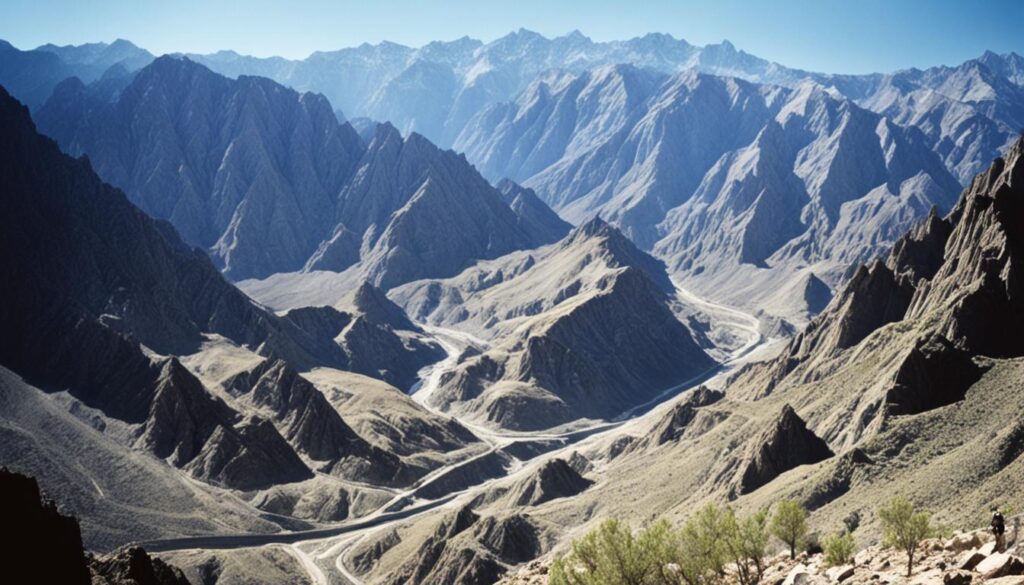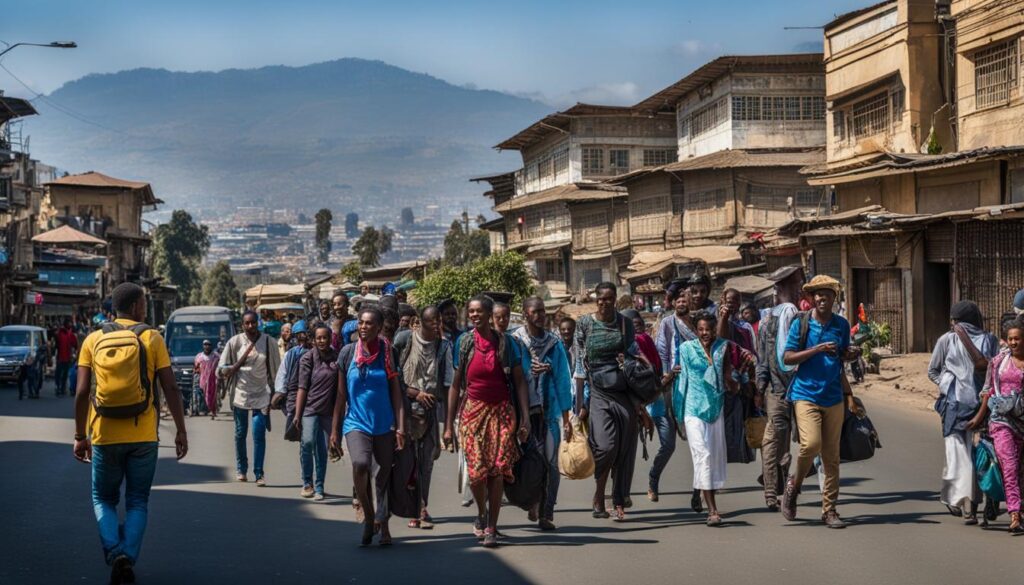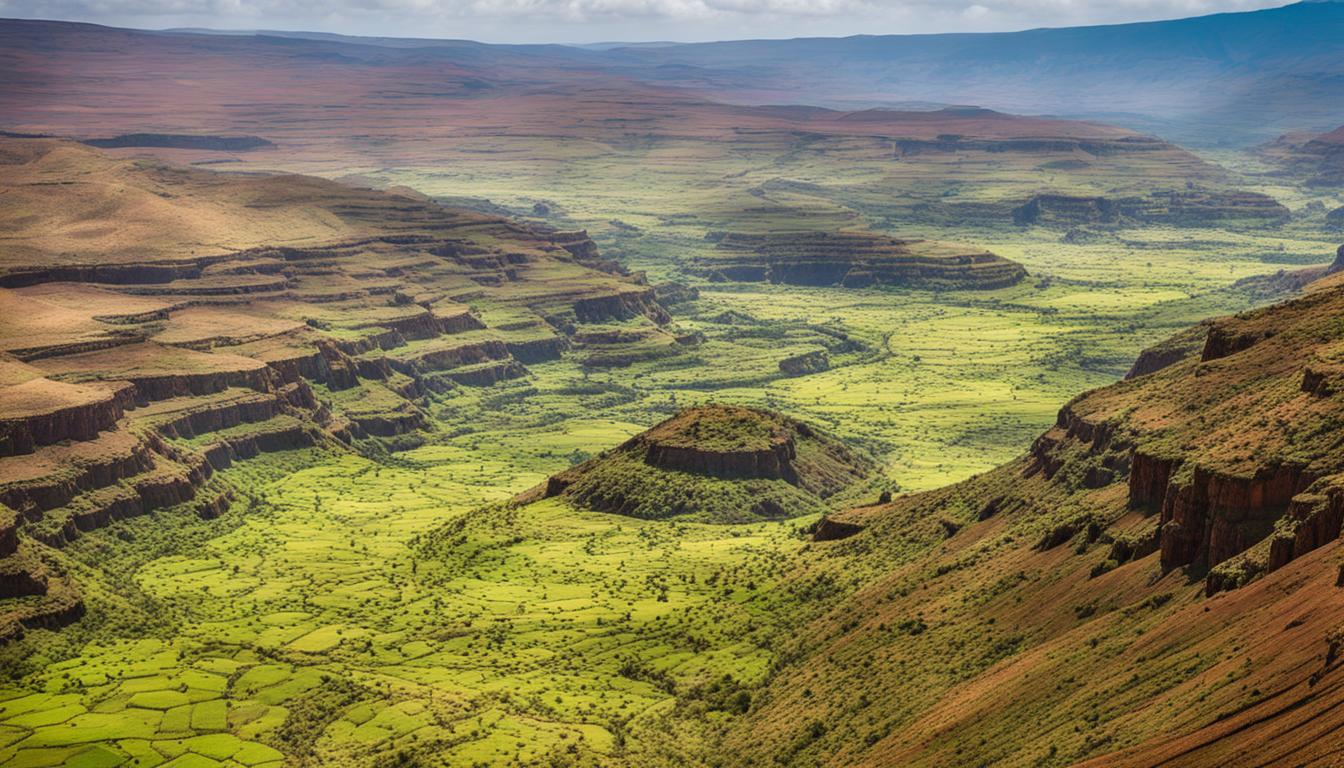Is Ethiopia Safe to Work?
Did you know that Ethiopia has experienced sporadic violent conflict, civil unrest, and crime in various regions, making the safety of workers a concern? With its diverse landscape and cultural heritage, Ethiopia offers promising work opportunities, but it’s important to consider the safety implications before committing to a job in this country.
Working in Ethiopia requires understanding the safety risks and taking necessary precautions to ensure a secure environment. Let’s delve deeper into the safety conditions and work opportunities in Ethiopia to help you make an informed decision.
Key Takeaways:
- Ethiopia experiences sporadic violent conflict, civil unrest, and crime in various regions.
- High-risk areas in Ethiopia include the Tigray Region, Afar-Tigray border areas, Amhara Region, Gambella and Benishangul Gumuz Regions, Oromia Region, and Southern Nations and National People’s Region.
- Travel restrictions are in place for certain conflict areas, limiting access for U.S. government personnel.
- Ethiopia’s border areas with Eritrea, Sudan, South Sudan, and Kenya carry security risks such as crime, kidnapping, and terrorism.
- It is important to take safety precautions, monitor local media, and stay alert while in Ethiopia.
Travel Restrictions and Conflict Areas in Ethiopia
When traveling to Ethiopia, it’s important to be aware of the travel restrictions and conflict areas in the country. Ethiopia experiences sporadic violent conflict, civil unrest, and ethnically motivated violence in certain regions. The following regions and specific zones are considered high-risk:
- Tigray Region
- Afar-Tigray border areas
- Amhara Region
- Gambella and Benishangul Gumuz Regions
- Specific zones in the Oromia Region: Horro-Guduru Wollega, East Wollega, West Wollega, Kelem Wollega, Illubabor, and Bale
- Towns and areas in the Southern Nations and National People’s (SNNP) Region: Gedeo, Konso, and Amaro and Derashe special woredas
Due to the security situation in these areas, travel by U.S. government personnel is limited to support humanitarian capacity and priority diplomatic engagement efforts.
| Region | Main Conflict Areas |
|---|---|
| Tigray Region | Tigray |
| Afar-Tigray border areas | Afar, Tigray |
| Amhara Region | Amhara |
| Gambella and Benishangul Gumuz Regions | Gambella, Benishangul Gumuz |
| Oromia Region | Horro-Guduru Wollega, East Wollega, West Wollega, Kelem Wollega, Illubabor, Bale |
| Southern Nations and National People’s (SNNP) Region | Gedeo, Konso, Amaro and Derashe special woredas |
It is crucial to stay informed about the current security situation in Ethiopia and adhere to the advice and guidelines provided by local authorities and embassies. By staying aware of the travel restrictions and conflict areas, you can ensure a safer and more enjoyable experience while exploring Ethiopia.
Border Areas and Security Risks in Ethiopia

In Ethiopia, the border areas with Eritrea, Sudan, South Sudan, and Kenya present several security risks that individuals should be aware of. These risks range from crime and kidnapping to civil unrest, sporadic violent conflict, terrorism, and landmines.
“The border with Eritrea remains heavily militarized despite a peace agreement.”
Despite a peace agreement, the border with Eritrea remains heavily militarized, with closed border roads. This militarization indicates the ongoing tensions and potential security threats in the area.
The areas near the borders with Sudan, South Sudan, and Kenya also experience frequent criminal activity, ethnic tensions, and confrontations between organized criminal groups, ethnic groups, and Ethiopian authorities. These factors further contribute to the security risks in these regions.
Ethiopian Border Areas and Security Risks at a Glance:
| Border | Security Risks |
|---|---|
| Eritrea | Heavily militarized, closed border roads |
| Sudan | Criminal activity, ethnic tensions, confrontations |
| South Sudan | Criminal activity, ethnic tensions, confrontations |
| Kenya | Criminal activity, ethnic tensions, confrontations |
Travelers and individuals residing near these border areas should exercise caution and stay informed about the security situation. It is essential to follow any travel advisories, maintain situational awareness, and adhere to local authorities’ guidance to ensure personal safety.
Sources:
- U.S. Department of State – Ethiopia Country Information
- CIA World Factbook – Ethiopia
Safety Precautions and Travel Tips for Ethiopia

When traveling to Ethiopia, it is important to prioritize your safety and take necessary precautions. Here are some essential safety tips and travel advice to ensure a secure and enjoyable visit:
1. Stay Informed
Monitor local media and stay updated on current events and security situations in Ethiopia. Be aware of any travel advisories or warnings issued by your government or relevant authorities.
2. Be Vigilant
Always maintain situational awareness and be alert to your surroundings. Avoid displaying signs of affluence or valuables that may attract unwanted attention. Stay cautious in crowded areas and be cautious of pickpockets.
3. Carry Important Documents
Keep a copy of your passport and visa with you at all times. Store digital copies in secure cloud storage as a backup. In case of loss or theft, having these documents readily available will help expedite the replacement process.
4. Enroll in STEP
Enroll in the Smart Traveler Enrollment Program (STEP) provided by your country’s government. This program allows the embassy to reach out to you in case of an emergency and helps them provide appropriate assistance.
5. Evacuation Plans
Make sure you have a contingency plan in place for emergencies that does not rely solely on the assistance of your government. Familiarize yourself with evacuation routes and have contact information for local emergency services.
6. Communication Disruptions
Due to the possibility of communication disruptions in Ethiopia, it is advisable to maintain multiple means of communication. Carry a phone with a local SIM card and have alternative methods of contacting emergency services or your embassy.
7. American Citizen Services
If you require emergency assistance or have any concerns, reach out to the American Citizen Services Unit at the embassy of your country. They can provide further guidance, support, and assistance during your stay in Ethiopia.
By following these safety precautions and travel tips, you can enhance your security while exploring the beautiful country of Ethiopia. For more information on travel restrictions and health advisories, refer to the official country information page and the CDC’s travel health recommendations for Ethiopia.
Crime and Personal Safety in Ethiopia
In Ethiopia, personal safety can be a concern due to various types of crime that occur in the country. Travelers should be aware of the risks and take necessary precautions to protect themselves and their belongings.
One common type of crime in Ethiopia is pickpocketing. Tourists and locals alike can fall victim to opportunistic thieves who target crowded areas. It is important to keep your belongings secure and be mindful of your surroundings to minimize the risk of being targeted.
Other types of criminal activities include purse snatching, mugging, theft from parked cars, and burglaries. Incidents of these crimes have been on the rise, particularly in crowded areas. While violent crime is relatively rare in Addis Ababa, there have been reports of armed assaults and muggings specifically targeting Westerners.
To ensure personal safety, it is advisable to take certain precautions. Keep your belongings secure and avoid displaying signs of affluence, as this can attract unwanted attention. It is also recommended to avoid walking alone after sundown, especially in unfamiliar or poorly lit areas.
Petty crime is particularly prevalent in areas such as Bole Medhanealem, Bole Atlas, Meskel Square, Merkato, and Entoto. Travelers should exercise caution and remain vigilant when visiting these areas.
For a visual representation of crime rates in Ethiopia, refer to the table below:
| City/Area | Crime Rate |
|---|---|
| Addis Ababa | Medium |
| Bole Medhanealem | High |
| Bole Atlas | High |
| Meskel Square | Medium |
| Merkato | High |
| Entoto | Medium |
While personal safety should be a priority when visiting Ethiopia, it’s important to note that the majority of visitors have a safe and enjoyable experience. By taking necessary precautions and staying alert, you can minimize the risk of becoming a victim of crime while exploring this beautiful country.
Conclusion
Working in Ethiopia presents unique challenges in terms of safety and security due to the presence of sporadic violent conflicts, civil unrest, and crime across various regions. Areas such as the Tigray Region, Afar-Tigray border areas, Amhara Region, Gambella and Benishangul Gumuz Regions, Oromia Region, and the Southern Nations and National People’s Region are considered high-risk.
It is crucial to prioritize personal safety by remaining informed about the current situation, following the advice of local authorities, and taking necessary precautions. Although job opportunities in Ethiopia exist, potential employees should assess work conditions and evaluate the level of workplace security offered before making any commitments.
By staying vigilant and aware of potential risks, individuals can mitigate safety hazards and enjoy a productive professional experience in Ethiopia. It is our responsibility to prioritize work safety, assess job opportunities, and ensure workplace security in order to thrive in this dynamic country.





